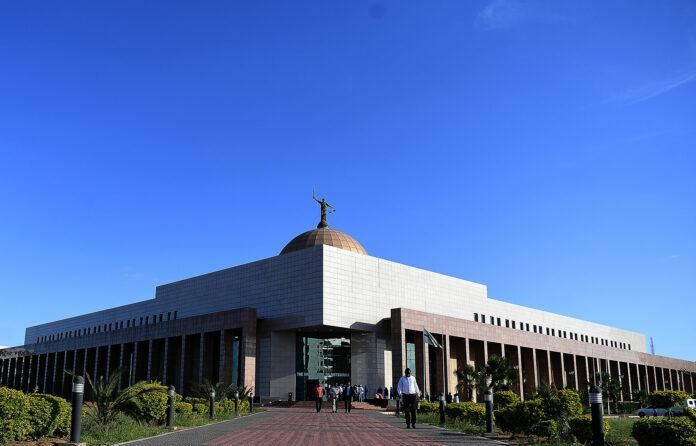Africa-Press – Botswana. Court of Appeal Judge Isaac Lesetedi has blocked the decision of the High Court declaring Prevailing Securities victorious against Botswana Unified Revenue Revenue (BURS)’ P80 million tax claim.
The High Court had ruled in favour of Danny Guduli in his capacity as the judicial Manager of Prevailing Securities against BURS and its Commissioner General.
Court records show that the company was accused of understating its income for the period between January 2013 and December 2017, with the BURS fining it over P78 million.
Guduli filed a review application before court after denying the allegations. The High Court agreed with him that BURS acted in bad faith by imposing a re-assessment and penalties solely based on the bank statements of the company.
The High Court also agreed that director of the company made out a case for review and succeeded in showing that the decision of the BURS Commissioner General to include non-income receipts and receipts that did not constitute a taxable supply was irrational and unreasonable.
“The re-assessment by BURS is hereby set aside including the consequent penalties imposed,” the High Court stated.
It further stated that while the bank statements may show the amount in the bank at any given point, they do not indicate the company’s profitability, the various taxes collected nor deductions that a taxpayer would be entitled to.
Court records indicate that Guduli’s reason for launching application in the High Court was also that there had been a long delay by the Commissioner dealing with the objection to the tax assessment and that this delay showed a settled mindset not to determine the objection lodged with her thus frustrating the utilisation of the domestic remedies.
But Justice Lesetedi was not convinced by the High Court’s findings. Delivering judgment, the Court of Appeal judge found that nothing is said about the higher authorities to the Commissioner in the domestic appeal process provided by the legislature i.e. the Board of Adjudicators and subsequently the High Court.
Lesetedi also indicated that it was not alleged by Guduli that there was any fundamental irregularity in the procedure followed in the assessment reached in January 2019 to assess the tax payer’s tax liability, a fundamental irregularity in procedure which could be remedied by the internal domestic remedies available.
Had that been the case, Lesetedi said, Guduli would not have challenged the tax assessment by way of an objection to the Commissioner under the tax legislation (utilisation of domestic remedy process) but would have filed an application for judicial review at that stage.
Lesetedi also stated that the main question that the Court of Appeal grappled with was whether the conduct by the Commissioner, who was a merely an early intermediary decision maker in a multi stage domestic appeal process, did by her delay, create a fundamental breach of Guduli’s administrative rights to have his challenge to the tax assessment meaningfully dealt with by the relevant domestic remedy bodies.
Court records indicate that BURS had stated that a less drastic remedy of seeking an order to compel the Commissioner to decide on the objections was the appropriate one as the High Court still retained power to consider the assessments on appeal within the prescribed domestic remedy route.
Lesetedi said the powers of the Board are quite extensive in respect of appeals before it, for instance, it can summon any witnesses and examine such under oath, it can require any person to produce any books or documents which are in his/her custody or under his/her control which the Board considers necessary for the purposes of the appeals.
He said both the Board of Adjudicators and High Court in their respective appellate powers under the ITA have the power to consider an appeal on the question of whether the decision on the objection was arbitrary and unreasonable of the ITA sections.
The judge said the High Court’s powers on an appeal are much wider than any powers it has on judicial review in that in the latter, its powers are merely limited to the question of whether such decision can be set aside on the grounds of irrationality or procedural fairness and, in the present case it was called upon to do so on what was evidently insufficient information.
The judge’s opinion is that this was a case in which Guduli had already chosen to utilise the domestic remedies available under the Income Tax Act (ITA). The judge said an internal appeal is the statutory remedy in virtually all income tax matters.
“This is because of the comprehensive nature of the internal remedies, the specialised qualifications of the Board of Arbitrators, its wide powers, the inclusion of the High Court and the Court of Appeal in the appellate structures as well as the limited nature of taxation appeals, the taxpayer’s complaint in the final analysis being almost always that he has been assessed to pay too much tax. Rarely will a court exercise its judicial review powers when the law gives it wider appellate powers.
Lesetedi said BURS ought to have succeeded in the High Court. Upholding the appeal with costs, Lesetedi set aside and replaced the High decision, “With an order that the application for judicial review is struck out with costs.”
For More News And Analysis About Botswana Follow Africa-Press






